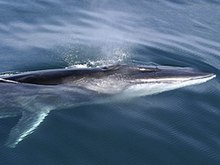Fin whales
| Fin Whale | |
|---|---|
 |
|
| A fin whale surfaces in the Kenai Fjords, Alaska | |
 |
|
| Size compared to an average human | |
| Scientific classification | |
| Kingdom: | Animalia |
| Phylum: | Chordata |
| Class: | Mammalia |
| Order: | Artiodactyla |
| Infraorder: | Cetacea |
| Family: | Balaenopteridae |
| Genus: | Balaenoptera |
| Species: | B. physalus |
| Binomial name | |
|
Balaenoptera physalus (Linnaeus, 1758) |
|
| Subspecies | |
|
|
 |
|
| Fin whale range | |
| Synonyms | |
|
|
The fin whale (Balaenoptera physalus), also called the finback whale, razorback, or common rorqual, is a marine mammal belonging to the suborder of baleen whales. It is the second-largest animal after the blue whale. The largest reportedly grow to 27.3 m (89.6 ft) long with a maximum confirmed length of 25.9 m (85 ft), a maximum recorded weight of nearly 74 tonnes (73 long tons; 82 short tons), and a maximum estimated weight of around 114 tonnes (112 long tons; 126 short tons). American naturalist Roy Chapman Andrews called the fin whale "the greyhound of the sea... for its beautiful, slender body is built like a racing yacht and the animal can surpass the speed of the fastest ocean steamship."
The fin whale's body is long and slender, coloured brownish-grey with a paler underside. The fin whale is a large baleen whale that belongs to the Cetacean order, which includes all species of whale, dolphin and porpoise. At least two recognized subspecies exist, in the North Atlantic and the Southern Hemisphere. It is found in all the major oceans, from polar to tropical waters. It is absent only from waters close to the ice pack at the poles and relatively small areas of water away from the open ocean. The highest population density occurs in temperate and cool waters. Its food consists of small schooling fish, squid, and crustaceans including copepods and krill.
Like all other large whales, the fin whale was heavily hunted during the 20th century and is an endangered species. Over 725,000 fin whales were reportedly taken from the Southern Hemisphere between 1905 and 1976, as of 1997 only 38,000 survived.
...
Wikipedia

